Trust and Communication, Pt 2

- Boundaries
- Reliability
- Accountability
- Vault
- Integrity
- Non Judgment
- Generosity
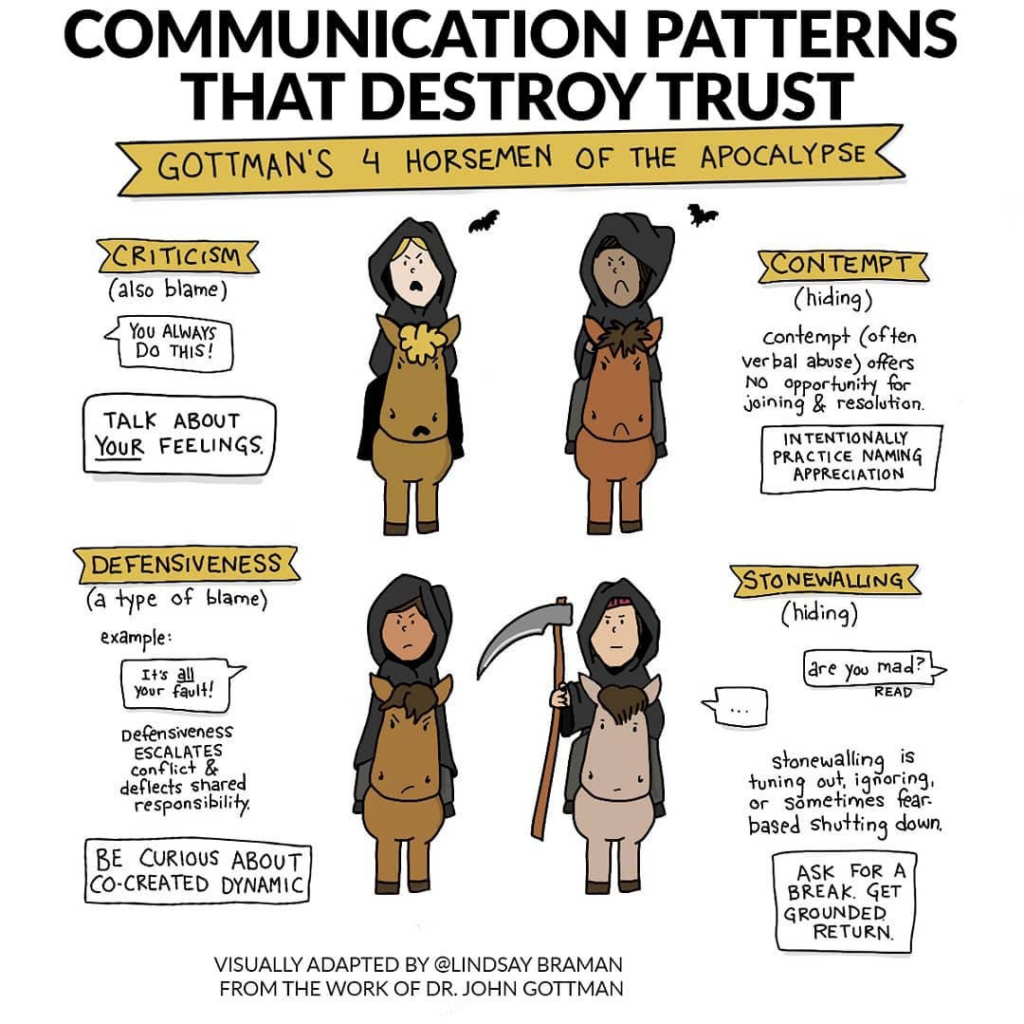
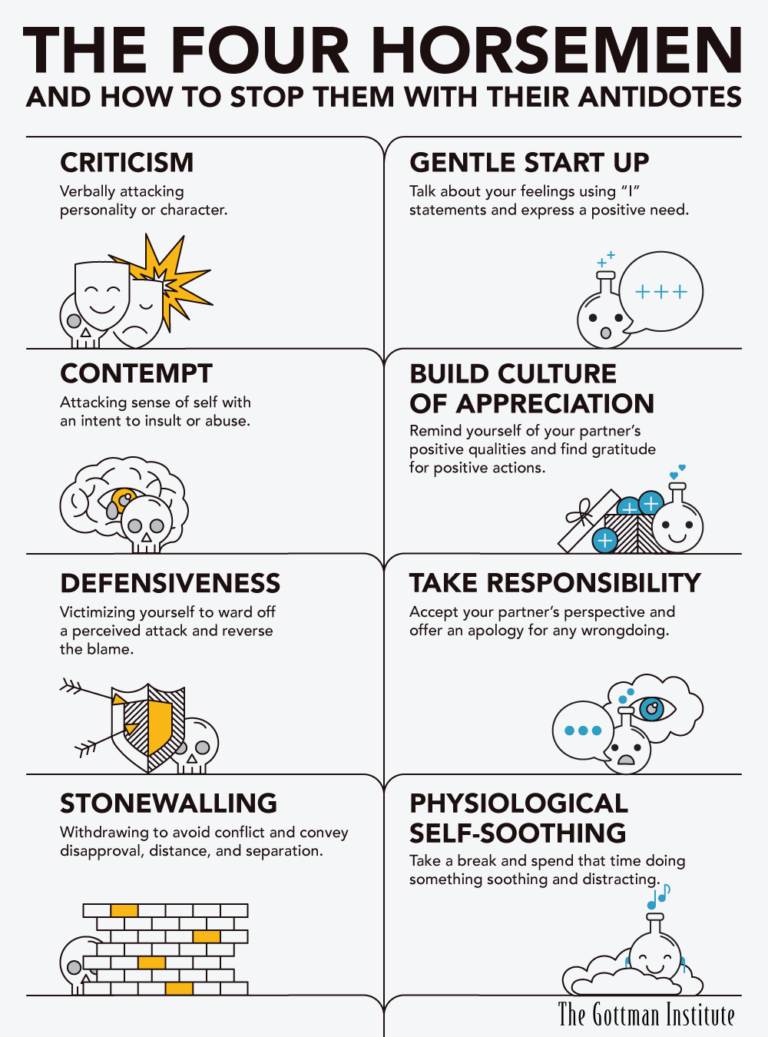
Trust and Communication, Pt. I

DEAR MAN
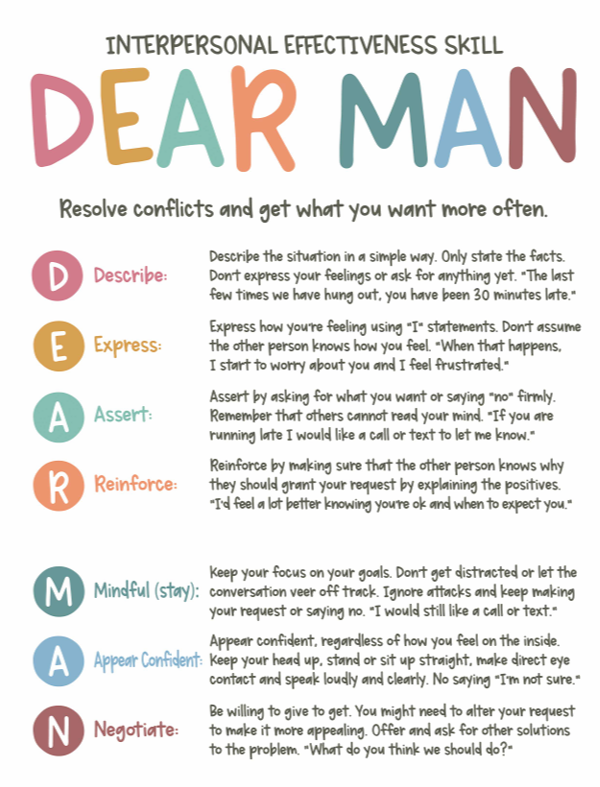
Give
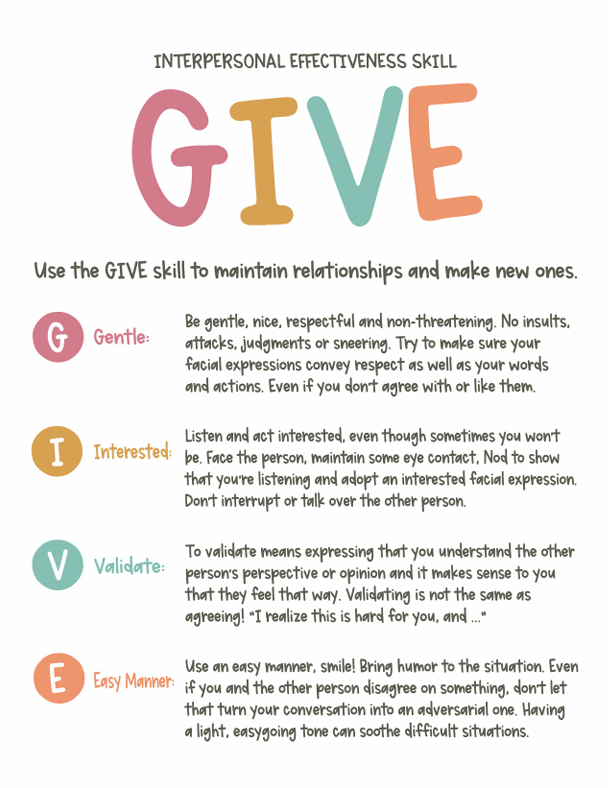
Fast
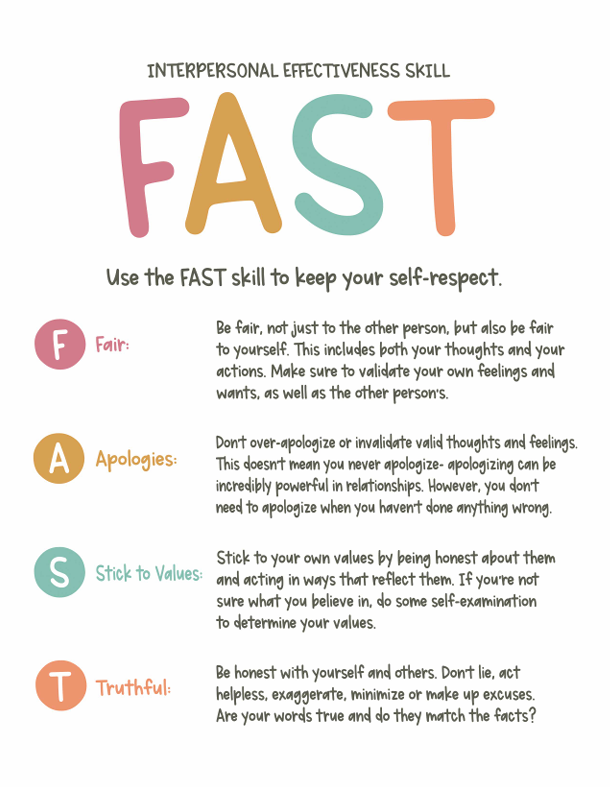
7 Things Couples Can Expect from Marriage Therapy


Marriage is a beautiful journey filled with love, companionship, and shared experiences. However, even the strongest of relationships can face challenges along the way.
Whether it’s communication issues, conflicts over finances, intimacy concerns, or any other hurdles, seeking support through marriage therapy can provide couples with invaluable tools to navigate these rough waters together.
1. A Safe and Supportive Environment
One of the first things couples can expect from marriage therapy is a safe and supportive environment where they can openly express their thoughts, feelings, and concerns. A skilled therapist creates a non-judgmental space where both partners feel heard and understood. This environment fosters trust and encourages honest communication, which is essential for resolving conflicts and strengthening the relationship.
2. Improved Communication Skills
Communication lies at the heart of every healthy relationship. Yet, many couples struggle to effectively express themselves and truly listen to their partner’s perspective. Marriage therapy helps couples develop better communication skills by teaching them how to constructively express their needs and emotions and actively listen to each other without judgment or defensiveness. These improved communication skills not only enhance the quality of the relationship but also serve as a foundation for resolving conflicts more peacefully.
3. Understanding Relationship Dynamics
Marriage therapy offers couples an opportunity to gain deeper insights into the dynamics of their relationship. Therapists help couples identify patterns of behavior, triggers for conflicts, and underlying issues that may be contributing to relationship distress. By understanding these dynamics, couples can break free from negative cycles and develop healthier ways of relating to each other.
4. Conflict Resolution Strategies
Conflicts are inevitable in any relationship, but how couples handle them can make all the difference. Marriage therapy equips couples with effective conflict-resolution strategies that enable them to address disagreements respectfully and constructively. Rather than resorting to blame or criticism, couples learn to communicate their needs, validate each other’s feelings, and work together to find mutually satisfactory solutions.
5. Strengthening Emotional Intimacy
Emotional intimacy is the foundation of a strong and fulfilling relationship. Marriage therapy helps couples deepen their emotional connection by fostering empathy, vulnerability, and closeness. Through various therapeutic techniques such as guided discussions, role-playing exercises, and experiential activities, couples can rekindle their bond and rediscover the joy of being emotionally connected to each other.
6. Rediscovering Shared Goals and Values
Over time, couples may find themselves drifting apart as individual priorities and life circumstances change. Marriage therapy allows couples to realign their goals and values, both as individuals and as a couple. By exploring what matters most to each partner and finding common ground, couples can reignite their sense of purpose and unity in the relationship.
7. Building Resilience
Marriage therapy is not just about resolving current issues; it’s also about equipping couples with the skills and resilience to weather future challenges together. Therapists empower couples to develop coping strategies, problem-solving skills, and a strong support network to sustain them through life’s ups and downs. By investing in their relationship through therapy, couples can build a foundation that withstands the test of time.
Find a Marriage Therapist for You
Looking for someone to help you and your spouse? Contact Psychological Preventative Health today to find the right couples therapist for you.
5 Tips For Couples Going Into Therapy


Relationships are hard.
A healthy marriage is a lot of work; sometimes, you need some help. If you are working to create a healthy relationship with your partner, the following tips will help you achieve better results.
Tip: Be Yourself
Many people feel pressured to hide flaws or pretend to be the perfect partner.
It can be frightening to share your thoughts and feelings in therapy, but this is essential to any healthy relationship. Hiding your true self to your partner may seem like a good idea initially because you want them to see an “ideal” version of you, but it can damage your long-term relationship.
Being true to yourself will help you build intimacy and create a deeper connection.
Tip: Be Honest
In marriage therapy, don’t lie to the therapist.
You might feel tempted to lie in therapy to avoid embarrassment or to prevent hurt feelings. However, even the best couples therapy techniques may not help if you aren’t honest.
Avoid these impulses by expressing your true feelings—even when difficult. The truth may be difficult to hear, but it is the only way to determine what you and your partner need to work on.
Tip: Share Your Goals
Before getting too deep into therapy, you and your partner should discuss your relationship goals. These goals can help you to stay on track, monitor your progress, and help you both to stay on the same page.
Some common goals to have are:
- Improved ways of communication
- Healthier ways to resolve conflict
- Finding the root causes of conflict
Tip: Active Listening
You should not only share your feelings and thoughts but also take the time to explain them.
After you explain yourself, make sure to actively listen to your partner when they are ready to express their point of view. It’s easy to get defensive; however, try understanding your partner’s perspective. Research consistently shows that active listening can greatly improve relationships.
You can show interest in what your partner has to say by being engaged in what they say. For example, nod along to statements or stare at them as they speak.
Tip: Ask Questions
Along with listening, ask questions. Asking the right questions can help you understand what your partner says or where they are coming from.
When asking questions, wait until your spouse is done talking first. This way, it shows that you care and validate their emotions. It also shows that you’re interested in learning more about them.
6 Reasons To Go To Couples Therapy


Maintaining a healthy and fulfilling relationship requires effort, communication, and understanding. However, even the strongest partnerships encounter challenges and conflicts that can strain the bond between partners.
When difficulties arise, seeking professional help through couples therapy can provide invaluable guidance and support. If you and your partner are considering therapy, here are six reasons to inspire you.
1. Enhancing Communication and Conflict Resolution Skills
One of the fundamental pillars of a successful relationship is effective communication.
Couples therapy offers a safe and neutral environment where couples can learn and practice healthier ways to express their needs, concerns, and emotions. Therapists provide invaluable tools and techniques to improve communication skills, such as active listening, assertiveness, and empathy.
In this space, couples can reduce misunderstandings, resolve conflicts, and deepen their connection by learning to communicate more effectively.
2. Gaining a Deeper Understanding of Each Other
One of the best things about couples therapy is that it facilitates a deeper understanding of one another’s thoughts, feelings, and perspectives.
Skilled therapists guide couples through conversations that uncover underlying issues, past traumas, and unmet needs. This increased awareness fosters empathy, compassion, and a greater appreciation for each other’s experiences. By gaining insight into their partner’s inner world, couples can strengthen their emotional connection and build a more solid foundation for their relationship.
3. Strengthening Relationship Bonds
Relationships evolve, which means couples need to nurture their bond continuously.
In couples therapy, partners can rediscover what initially drew them together and reignite the spark that may have diminished over time. Therapists guide couples in developing shared goals, interests, and values, fostering a sense of partnership and teamwork. Couples can build a resilient and enduring connection by investing in their relationship through therapy.
4. Resolving Long-standing Issues
Unresolved issues and resentments can create a significant strain on a relationship.
Couples therapy provides a structured and supportive environment for addressing these long-standing concerns. Therapists assist couples in identifying the root causes of conflicts and guiding them toward effective resolution. This process promotes forgiveness, healing, and a sense of closure, allowing couples to move forward with a renewed sense of harmony.
5. Strengthening Emotional and Mental Well-being
Relationship difficulties can take a toll on individuals’ emotional and mental well-being.
Couples therapy focuses on the relationship itself and offers support for individual growth. Therapists help partners develop self-awareness, self-esteem, and coping strategies to manage stress and emotional challenges. As individuals experience personal growth, they bring a healthier and more balanced self to the relationship, benefiting both partners.
6. Preventing Future Issues
Couples therapy is not solely reserved for relationships in distress; engaging in therapy as a preventative measure can be incredibly beneficial.
In therapy, couples can prevent lingering issues from escalating into significant challenges by addressing minor concerns early on. Additionally, couples therapy equips partners with tools to effectively navigate future conflicts and maintain a healthy relationship in the long term.
Dating 101-Why Doesn’t He Call Me Back?


Men are not as complicated as we think they are. And for that matter, neither are women. We
are just different, and while we understand we are different, no one ever really shows us how
much different we truly are. At PPH Therapy we teach you how to understand those unique
differences and how to take advantage of both individuals inherent differences instead of
making our lives more difficult. Biology shows that we are social creatures, we want
companionship and to be with other people. Often, we hear people say “I am fine to be alone, and that’s fine, however “I want to be alone forever”, is rarely stated.
The age-old complaint of men using women for sex and women using men for money is
notorious and can be infuriating to both sides. However, it goes back to biology as well. Men
and women are programmed to meet biological needs. For men, sex ensures their genetics are
passed down. For women, money, aka security ensures that they can take care of their children without having to worry about the necessities such as food, and physical protection.
While we can expand on this more and we will, for now here are a few tips for the ladies, and as a side note, men would do well to take note of this too as this helps you, (you just don’t realize it yet).
Little Effort- Ladies, effort is the key word here. A man values what he has to work
for; if he puts little effort into the relationship startup, he will put little effort into you in
the long run. This includes initiation which can be explained in the following paragraph.
Initiation- You initiate all the texts, calls, and contact. If a man really wants you he
will yearn for contact both emotionally and physically. if you do all the work- well, lets
just say he will take it, but in a nutshell, he doesn’t have to work for it, so it is not valued
as much. Now some will say initiation is good for women too, and it is-minimally. We are
always looking for that fine line, just don’t be on the wrong side of that line ladies.
Last-minute Invites- This one should be self-explanatory, but I will explain it anyway.
Generally, if you are after a hook-up only… well, then this is your green light. Go ahead,
and accept that late notice invitation. Of course there are always exceptions to the rule,
but statistically speaking… the odds are not in your favor, so gamble away!
Xbox or Porngraphy- These pretty little habits are not so pretty although people want
to believe that they are harmless. “I am not cheating on my wife, all I want to do is relax
a little”, is what I hear over and over. However they are a means of instant gratification
that promotes deterioration of relationships by reducing effort. (See bullet point #1) We
can get into this at another time. But for the sake of these tips right now… Xbox and
Porn (red flags)= no bueno!
Goal Achievement- He obtained the goal too quickly. Men gain self-esteem through
accomplishing tasks, goals, and objectives. What happens to effort when a goal is
obtained? Well, if you haven’t figured it out then read on…
Goal Attainment = Effort Decline = Effort Decline in YOUR Relationship = NOT GOOD

Now, don’t get me wrong, I don’t personally believe that men are trying to be
manipulative or vindictive, but I do believe that GENERALLY, and I capitalize that as
there are always exceptions to the rules, GENERALLY men don’t think that far ahead!
They are just trying to meet a need and once met, (unless they have put a signification
amount of TIME and ENERGY into the relationship), they go after the next need, or
want…aka another woman to put it bluntly.
Needs- Never meet his needs before yours are being met. Men value what they have
to work for, and effort declines once they have obtained that. Once again I feel like I
may be sounding like a broken record here, but this is important so I repeat…Men value
what they work for NOT what is given to them. They will take what is given to them for
sure but this lowers their self -esteem as well as yours in the process. I can explain this
later, but men increase in personal self-esteem by giving and women by receiving and
yet we tend to sway in the opposite direction these days.
And finally…
Value Yourself- If you do not, no one will. What does this look like for you?
While these tips are not exhaustive by any means, we become better by not biting off
too much. Practice these, and when your good at implementing, come back for more!
– Melanie



